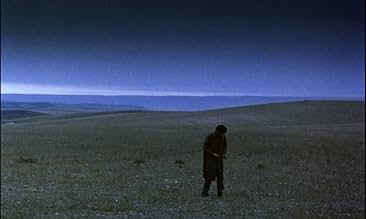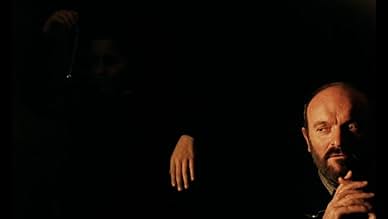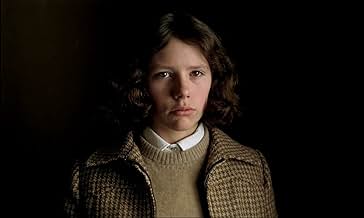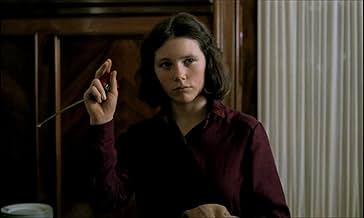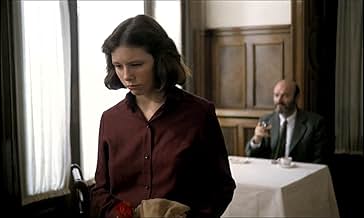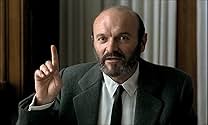IMDb-BEWERTUNG
7,8/10
6585
IHRE BEWERTUNG
Füge eine Handlung in deiner Sprache hinzuA woman reflects on her childhood relationship with her father, attempting to understand the depths of his despair and the truth of his myths.A woman reflects on her childhood relationship with her father, attempting to understand the depths of his despair and the truth of his myths.A woman reflects on her childhood relationship with her father, attempting to understand the depths of his despair and the truth of his myths.
- Auszeichnungen
- 7 Gewinne & 2 Nominierungen insgesamt
Aurore Clément
- Irene Ríos
- (as Aurora Clement)
- …
María Massip
- Estrella adulta
- (Synchronisation)
José Luis Fernández 'Pirri'
- Carioco
- (Synchronisation)
- (Nicht genannt)
José García García Morilla
- Chófer
- (Nicht genannt)
Chus Lampreave
- Casilda
- (Nicht genannt)
Jesús Nieto
- Agustín Arenas- voz
- (Nicht genannt)
Handlung
WUSSTEST DU SCHON:
- WissenswertesDirector Víctor Erice considers this to be an unfinished project. The original script consisted of more than 400 pages and was scheduled to be shot in 81 days. 48 days into shooting, when production was to be moved to the south of Spain, producer Elías Querejeta unexpectedly suspended the project, allegedly because of financing objections by Televisión Española, the backing television network. However, Querejeta revealed years later that he made the decision because he thought the film was complete with what they'd shot so far.
- VerbindungenFeatured in Huellas de un espíritu (1998)
- SoundtracksLa puerta del Sagrario
Composed by Enric Granados
Ausgewählte Rezension
Unless there are impenetrable barriers, most young children love their parents unconditionally, perceiving them as all knowing and all loving. Of course, with growing up often comes a realization that the parents you put on a pedestal are just human beings with flaws, some small, some big. This realization comes reluctantly to Estrella in Victor Erice's poignant 1983 film, El Sur (The South, the beautiful story of the relationship of a daughter and her father, one of only three feature films Erice made in forty years, each one a masterpiece.
Based on the novella of the same name by Adelaida Garcia Morales, the story takes place in the context of post–civil war Spain. Narrated powerfully by fifteen-year-old Estrella, the film is composed of memories and fantasies as she seeks to make sense of the painful events of her childhood. Shot by cinematographer José Luis Alcaine using only natural light, the opening conveys a feeling of an enchanted world. In the first frame, Estrella (Iciar Bollain) awakens in a darkened room with the light focusing only on her. The camera zooms to her hands as she discovers a small box under her pillow containing the pendant her father used as a divining rod.
In her memory, it is the symbol of her father's power that he once used to guess her sex by holding the pendant over her mother's stomach. In the background, we hear a dog barking and Estrella's mother (Lola Cardona) calling for her husband Agustín (Omero Antonutti), but he is nowhere to be found and Estrella knows that he is not coming back. It is only then that the camera moves to her face where a tear is visible. El Sur then flashes back seven years when eight-year-old Estrella, sensitively portrayed by Sonsoles Aranguren, and her parents have moved from the south of Spain and are traveling by train to the north where Agustin has found a job as a doctor in a local hospital.
Estrella's insights into events taking place around her are mature beyond her age. "I grew up more or less like everyone else," she says, getting used to being alone and not thinking too much about happiness." When she is older, her father, whom she idolizes, instructs her in the art of divination and she looks at it as a transfer of a supernatural gift. The slow-developing story reveals the shift in Estrella's perception both of her father and of her country. As she begins to learn more about the war that divided her family and her country, her view of the south as the mythical place depicted in postcards and movies, begins to unravel.
To Estrella, her father's life in the south has always been a mystery and she questions Milagros (Rafaela Aparicio), her father's former governess who is visiting their house, about his life. The governess tells her of the rift her father had with his own father who favored Franco in the Spanish Civil War, and how unhappy his life had been when he was growing up. Estrella's discovery of Agustin's devotion to the starlet Irene Rios (Aurore Clément) whose films played at the local theater is even more unsettling, however, as is the matter of his continuing relationship with a mysterious woman in the south.
The nature of the circumstances that are revealed in the film, however, do not prepare us sufficiently for the events that follow. Forced to curtail production before completion, Erice would have traced Estrella's journey back to the south to uncover the reality of her father's despair, but lack of funding did not permit this and the film, which Erice claims would have become much lighter in tone, was never finished. Although, because of the film's incompleteness, character motivations are murky, El Sur is still a brilliant and haunting work of art. A timeless film of symbol and myth, it was voted the sixth best Spanish film in the 1996 Spanish cinema centenary.
Based on the novella of the same name by Adelaida Garcia Morales, the story takes place in the context of post–civil war Spain. Narrated powerfully by fifteen-year-old Estrella, the film is composed of memories and fantasies as she seeks to make sense of the painful events of her childhood. Shot by cinematographer José Luis Alcaine using only natural light, the opening conveys a feeling of an enchanted world. In the first frame, Estrella (Iciar Bollain) awakens in a darkened room with the light focusing only on her. The camera zooms to her hands as she discovers a small box under her pillow containing the pendant her father used as a divining rod.
In her memory, it is the symbol of her father's power that he once used to guess her sex by holding the pendant over her mother's stomach. In the background, we hear a dog barking and Estrella's mother (Lola Cardona) calling for her husband Agustín (Omero Antonutti), but he is nowhere to be found and Estrella knows that he is not coming back. It is only then that the camera moves to her face where a tear is visible. El Sur then flashes back seven years when eight-year-old Estrella, sensitively portrayed by Sonsoles Aranguren, and her parents have moved from the south of Spain and are traveling by train to the north where Agustin has found a job as a doctor in a local hospital.
Estrella's insights into events taking place around her are mature beyond her age. "I grew up more or less like everyone else," she says, getting used to being alone and not thinking too much about happiness." When she is older, her father, whom she idolizes, instructs her in the art of divination and she looks at it as a transfer of a supernatural gift. The slow-developing story reveals the shift in Estrella's perception both of her father and of her country. As she begins to learn more about the war that divided her family and her country, her view of the south as the mythical place depicted in postcards and movies, begins to unravel.
To Estrella, her father's life in the south has always been a mystery and she questions Milagros (Rafaela Aparicio), her father's former governess who is visiting their house, about his life. The governess tells her of the rift her father had with his own father who favored Franco in the Spanish Civil War, and how unhappy his life had been when he was growing up. Estrella's discovery of Agustin's devotion to the starlet Irene Rios (Aurore Clément) whose films played at the local theater is even more unsettling, however, as is the matter of his continuing relationship with a mysterious woman in the south.
The nature of the circumstances that are revealed in the film, however, do not prepare us sufficiently for the events that follow. Forced to curtail production before completion, Erice would have traced Estrella's journey back to the south to uncover the reality of her father's despair, but lack of funding did not permit this and the film, which Erice claims would have become much lighter in tone, was never finished. Although, because of the film's incompleteness, character motivations are murky, El Sur is still a brilliant and haunting work of art. A timeless film of symbol and myth, it was voted the sixth best Spanish film in the 1996 Spanish cinema centenary.
- howard.schumann
- 16. März 2013
- Permalink
Top-Auswahl
Melde dich zum Bewerten an und greife auf die Watchlist für personalisierte Empfehlungen zu.
- How long is El Sur?Powered by Alexa
Details
- Erscheinungsdatum
- Herkunftsländer
- Offizieller Standort
- Sprache
- Auch bekannt als
- El Sur
- Drehorte
- Produktionsfirmen
- Weitere beteiligte Unternehmen bei IMDbPro anzeigen
Box Office
- Weltweiter Bruttoertrag
- 22.720 $
Zu dieser Seite beitragen
Bearbeitung vorschlagen oder fehlenden Inhalt hinzufügen

Oberste Lücke
By what name was El Sur - Der Süden (1983) officially released in Canada in English?
Antwort
